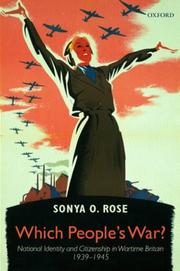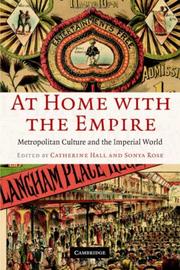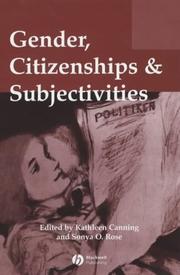| Listing 1 - 10 of 19 | << page >> |
Sort by
|
Book
ISBN: 0415056543 Year: 1992 Publisher: London Routledge
Abstract | Keywords | Export | Availability | Bookmark
 Loading...
Loading...Choose an application
- Reference Manager
- EndNote
- RefWorks (Direct export to RefWorks)
396 <420> "18" --- Feminisme. Vrouwenbeweging. Vrouw en maatschappij--Engeland--19e eeuw. Periode 1800-1899 --- Sex role --- Sex discrimination in employment --- Working class women --- Women --- Capitalism --- History --- Employment --- 396 <420> "18" Feminisme. Vrouwenbeweging. Vrouw en maatschappij--Engeland--19e eeuw. Periode 1800-1899
Book
ISBN: 9780745646152 9780745646145 0745646158 074564614X Year: 2010 Publisher: Cambridge Polity
Abstract | Keywords | Export | Availability | Bookmark
 Loading...
Loading...Choose an application
- Reference Manager
- EndNote
- RefWorks (Direct export to RefWorks)
man --- vrouw --- #SBIB:316.346H00 --- Man-vrouw-studies, gender: algemeen --- Gender identity --- Sekseverschillen. --- Feminist theory. --- Sex role --- History. --- Philosophy. --- History --- Sociology of the family. Sociology of sexuality --- sociale geschiedenis --- Feminist theory --- Gender role --- Sex (Psychology) --- Sex differences (Psychology) --- Social role --- Gender expression --- Sexism --- Sex identity (Gender identity) --- Sexual identity (Gender identity) --- Identity (Psychology) --- Queer theory --- Feminism --- Feminist philosophy --- Feminist sociology --- Theory of feminism --- Philosophy --- Gender roles --- Gendered role --- Gendered roles --- Role, Gender --- Role, Gendered --- Role, Sex --- Roles, Gender --- Roles, Gendered --- Roles, Sex --- Sex roles --- Gender dysphoria --- Race --- Gender --- Body --- Masculinity --- Men --- Revolutions --- Sexuality --- Social class --- Theory --- Book
Book
ISBN: 9786610032341 1134934408 1280032340 0203167996 9780203167991 9781134934355 9781134934393 9781134934409 9780415056540 Year: 1992 Publisher: Berkeley : University of California Press,
Abstract | Keywords | Export | Availability | Bookmark
 Loading...
Loading...Choose an application
- Reference Manager
- EndNote
- RefWorks (Direct export to RefWorks)
Integrating analytical tools from feminist theory, cultural studies and sociology to illuminate detailed historical evidence, Sonya Rose argues that gender was a central principle of the 19th century industrial transformation in England.
Sex role --- Sex discrimination in employment --- Working class women --- Women --- Capitalism --- Market economy --- Economics --- Profit --- Capital --- Human females --- Wimmin --- Woman --- Womon --- Womyn --- Females --- Human beings --- Femininity --- Employment (Economic theory) --- Sex role in the work environment --- Sexual division of labor --- Gender role --- Sex (Psychology) --- Sex differences (Psychology) --- Social role --- Gender expression --- Sexism --- History --- Employment --- Gender roles --- Gendered role --- Gendered roles --- Role, Gender --- Role, Gendered --- Role, Sex --- Roles, Gender --- Roles, Gendered --- Roles, Sex --- Sex roles

ISBN: 0199255725 0199273170 Year: 2004 Publisher: Oxford Oxford University Press
Abstract | Keywords | Export | Availability | Bookmark
 Loading...
Loading...Choose an application
- Reference Manager
- EndNote
- RefWorks (Direct export to RefWorks)
History of the United Kingdom and Ireland
---
anno 1930-1939
---
anno 1940-1949
---
316.37
---
942.083
---
316.37 Identiteit. Individu en maatschappij. Persoonlijkheid
---
Identiteit. Individu en maatschappij. Persoonlijkheid
---
942.083 Geschiedenis van Engeland--(1919-1945)
---
Geschiedenis van Engeland--(1919-1945)
---
Citizenship
---
National characteristics, British
---
Nationalism
---
World War, 1939-1945
---
#BIBC:ruil
Article
Abstract | Keywords | Export | Availability | Bookmark
 Loading...
Loading...Choose an application
- Reference Manager
- EndNote
- RefWorks (Direct export to RefWorks)
Article
Abstract | Keywords | Export | Availability | Bookmark
 Loading...
Loading...Choose an application
- Reference Manager
- EndNote
- RefWorks (Direct export to RefWorks)

ISBN: 9780521854061 0521854067 9780521670029 0521670020 9780511802263 9780511261206 0511261209 0511258089 9780511258084 0511259387 9780511259388 0511260032 9780511260032 1280749210 9781280749216 9780511320002 0511320000 0511802269 1107165725 0511260636 Year: 2006 Publisher: Cambridge Cambridge University Press
Abstract | Keywords | Export | Availability | Bookmark
 Loading...
Loading...Choose an application
- Reference Manager
- EndNote
- RefWorks (Direct export to RefWorks)
This pioneering 2006 volume addresses the question of how Britain's empire was lived through everyday practices - in church and chapel, by readers at home, as embodied in sexualities or forms of citizenship, as narrated in histories - from the eighteenth century to the present. Leading historians explore the imperial experience and legacy for those located, physically or imaginatively, 'at home,' from the impact of empire on constructions of womanhood, masculinity and class to its influence in shaping literature, sexuality, visual culture, consumption and history-writing. They assess how people thought imperially, not in the sense of political affiliations for or against empire, but simply assuming it was there, part of the given world that had made them who they were. They also show how empire became a contentious focus of attention at certain moments and in particular ways. This will be essential reading for scholars and students of modern Britain and its empire.
History of the United Kingdom and Ireland --- History of civilization --- anno 1700-1799 --- anno 1800-1999 --- Imperialism --- Social aspects --- Colonialism --- Empires --- Expansion (United States politics) --- Neocolonialism --- Political science --- Anti-imperialist movements --- Caesarism --- Chauvinism and jingoism --- Militarism --- Great Britain --- Civilization --- Social life and customs --- Arts and Humanities --- History

ISBN: 1405100265 Year: 2002 Publisher: Oxford : Blackwell,
Abstract | Keywords | Export | Availability | Bookmark
 Loading...
Loading...Choose an application
- Reference Manager
- EndNote
- RefWorks (Direct export to RefWorks)

ISBN: 0801429226 0801481465 1501724185 Year: 1996 Publisher: Ithaca, N.Y. Cornell University Press
Abstract | Keywords | Export | Availability | Bookmark
 Loading...
Loading...Choose an application
- Reference Manager
- EndNote
- RefWorks (Direct export to RefWorks)
Gender figured significantly in the industrial, social, and political transformations of the United Kingdom and Ireland, France, Germany, and Russia. This book explores its importance during a period of radical change for the working classes, from 1800 through the 1930s. Collectively, the authors demonstrate how the study of gender can lead to a new understanding of working class history. The authors-leading historians, sociologists, and feminist scholars ask how gender meanings and relations shaped and were shaped by transformations in areas ranging from the Irish linen industry to German social policy, from the French labor movement to Britain's interracial settlements. With special attention to the importance of language and culture in social life, they show how political identities are constituted and social categories created, contested, and changed-and how gender plays a central role in this process. Contributors: Kathleen Canning, University of Michigan; Helen Harden Chenut, Centre National de la Recherche Scientifique, Paris; Anna Clark, University of North Carolina, Charlotte; Judy Coffin, University of Texas, Austin; Jane Gray, St. Patrick's College, Maynooth, Republic ofireland; Tessie P. Llu, Northwestern University; Judith F. Stone, Western Michigan University; Laura Tabili, University of Arizona; Eric D. Weitz, St. Olaf College; Elizabeth A. Wood, Massachusetts Institute of Technology.
Sociology of the family. Sociology of sexuality --- Sociology of work --- Europe --- Women --- Working class --- Femmes --- Travailleurs --- Employment --- History --- Case studies. --- Travail --- Histoire --- Cas, Etudes de --- werkgelegenheid --- arbeidsters --- Europa --- anno 1900-1999 --- anno 1800-1899 --- France --- Russia --- Ireland --- Great Britain --- Germany --- Italy --- Commons (Social order) --- Labor and laboring classes --- Laboring class --- Labouring class --- Working classes --- Social classes --- Labor --- Human females --- Wimmin --- Woman --- Womon --- Womyn --- Females --- Human beings --- Femininity --- Employment&delete& --- History&delete& --- Case studies --- Women - Employment - Europe - History - Case studies. --- Working class - Europe - History - Case studies. --- arbeiders --- vrouwen --- SEXISME --- EUROPE --- CONDITIONS SOCIALES --- FEMMES --- CONDITIONS ECONOMIQUES --- FAMILLES --- HISTOIRE --- 19E-20E SIECLES --- Gender --- Industrialisation --- Income --- Labour law --- Working-class women --- Book --- Europa.
Book
ISBN: 0199983704 0197513123 Year: 2020 Publisher: New York : Oxford University Press,
Abstract | Keywords | Export | Availability | Bookmark
 Loading...
Loading...Choose an application
- Reference Manager
- EndNote
- RefWorks (Direct export to RefWorks)
The handbook is a reference work of thirty-two essays jointly written by specialists in the history of military and war and experts in gender and women's history. The collection, covering four centuries from the Thirty Years' War to the present Wars of Globalization, investigates how gender contributed to the shaping of warfare and the military and was at the same time transformed by them. The essays explore this question by focusing on themes such as the cultural representations of military and war; war mobilization of and war support by society; war experiences on the home fronts and battlefronts; gendered war violence; military service and citizenship; war demobilization, postwar societies, and memories; and attempts to regulate and tame warfare and prevent new wars.
Women and war --- War --- War and society --- History. --- Sex differences.
| Listing 1 - 10 of 19 | << page >> |
Sort by
|

 Search
Search Feedback
Feedback About UniCat
About UniCat  Help
Help News
News